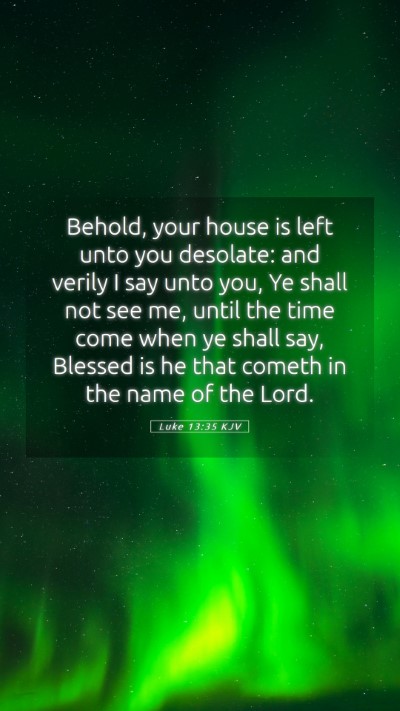Understanding Luke 13:35 - Bible Verse Commentary
Luke 13:35 states: "Behold, your house is left unto you desolate: and verily I say unto you, Ye shall not see me, until the time come when ye shall say, Blessed is he that cometh in the name of the Lord." This passage comes from a moment of sorrow as Jesus laments over Jerusalem, which has resisted divine intervention and failed to recognize His presence.
Bible Verse Meanings
The meaning of this verse stands at a poignant intersection of hope and condemnation. Jesus’ lament indicates that the spiritual condition of Jerusalem has become desolate due to its rejection of His message. At the same time, it suggests a future time when those who were once blind to His identity will acknowledge Him as the Messiah.
Bible Verse Interpretations
- Matthew Henry emphasizes the sorrow of Jesus as he recognizes the judgment that has come upon a city that has resisted God’s prophets throughout history. He states that Jerusalem's desolation is a consequence of its unrepentant heart.
- Albert Barnes notes that "your house" refers to the temple and the city of Jerusalem, signifying the loss of God’s presence and favor. He interprets this verse as a prophetic warning, illustrating the consequences of rejecting divine truth.
- Adam Clarke expands on this, pointing out that the "Blessed is he that cometh" signifies a prophetic recognition of Jesus' eventual acceptance by the people, which they will proclaim in the future. Clarke suggests that this verse highlights the hope of redemption despite impending judgment.
Bible Verse Understanding
To fully grasp the significance of Luke 13:35, one must consider its historical context. Jerusalem had a rich biblical history, being the site of God’s covenant with His people. However, the city had left its spiritual foundations, prompting Jesus’ lament. This sobering passage serves as a reminder that recognizing and accepting Jesus is crucial for spiritual restoration and salvation.
Bible Study Insights
In studying this verse, one can glean insights on:
- The importance of acknowledging truth when it is presented, as rejection leads to desolation.
- The notion of prophetic fulfillment; while Jerusalem faced destruction, the future acceptance of Jesus remains an ongoing testament of hope.
- The meaning of desolation in a spiritual sense, emphasizing the need for a personal relationship with Jesus to avoid spiritual emptiness.
Application of Luke 13:35
This verse has pertinent applications for believers today. It encourages reflection on how individuals respond to God’s messages and reveals the importance of avoiding complacency in faith. As modern readers, it challenges us to seek a relationship with Jesus and remain vigilant in recognizing His influence in our lives.
Related Bible Cross References
- Matthew 23:37-39 - Jesus laments over Jerusalem, showing continuity of His sorrow for rejection.
- John 1:11 - Jesus came to His own, yet they did not receive Him, affirming the theme of rejection.
- Romans 11:25-26 - The eventual recognition of Jesus as the Messiah by Israel, paralleling themes of hope and acceptance in Luke 13:35.
Conclusion
In conclusion, Luke 13:35 serves as a powerful reminder of the divine desire for connection and acknowledgment. By exploring the rich commentary and exegesis surrounding this verse, individuals can deepen their understanding of Scripture and its transformative implications, positioning themselves ideally for deeper Bible study and enrichment.


